Enab Baladi’s investigation team
Mohamed Homos- Murad Abdul Jalil- Nour Dalati
Starting from areas under settlement agreements, the Syrian regime re-activated its security control by monitoring telephone lines and citizens’ phone calls to observe their relatives’ movements in the immigration areas in the north of Syria, forming a digital barrier between families that have been dispersed and displaced.
Once again, phone calls have become a source of concern for Syrians who have succeeded in eliminating all security intrusions imposed by the regime during the years of the revolution. Several questions have been asked about the impact of this security oversight on areas, which are still under the control of opposition factions, on the one hand, and on the population residing in regions taken over by the regime.
Enab Baladi has investigated several cases in which citizens of Damascus, its environs and areas under settlement truces have been arrested after having exchanges via telephones with their relatives in the north of Syria or abroad.
One of the media activists, who left Ghouta towards the city of Afrin following the settlement that took place in Ghouta last February, confirmed that Syrians living in Eastern Ghouta are the ones who suffer most from the regime’s telecommunication surveillance.
“My 50-year-old aunt was interrogated for several days at the State Security Branch in Damascus at the end of last October, after having several telephone conversations with her son, who lives in Afrin,” said the activist, who asked not to be identified due to concerns about the safety of his relatives living in areas controlled by the regime.
Last September, the correspondent of Enab Baladi in Damascus reported that the regime arrested six women in the city of Arbain in Eastern Ghouta after tracking phone calls between these women and their relatives in the north of Syria.
The media activist told Enab Baladi that “after these arrests, many people began to avoid any contact they might have with their families. Some of them resorted to cutting ties with relatives living in Idlib and blocking them from all communication means and applications.
While others employed “alternative solutions” to circumvent the state of surveillance imposed on telephones, including the use of foreign numbers in activating WhatsApp application or utilizing fake Facebook accounts, as stated by the media activist.
Syrians located in the northern countryside of Homs faced the same concerns following the implementation of a settlement agreement that led to the regime’s control of the region last May.
According to Enab Baladi’s correspondent in the area, locals have stopped using their cell phone chips connected to Syriatel and MTN networks (the only two local mobile companies in Syria) after the regime took charge of the region. They started relying on specific online applications such as Telegram, which is considered as more secure compared to other communication programs.
These cases have stirred real concerns among residents of the Syrian capital, who communicate with their displaced or expatriate folks. Thus, questions about safer communication applications and ways to avoid surveillance resurfaced on their list of daily worries, according to a local source in Damascus who declined being named for security concerns.
The source added that most of the residents of Damascus became more concerned than ever about conducting mobile phone exchanges as a result of recurrent arrests that took place after tracking phone calls between Syrian citizens and their relatives in other regions.
As for the north of Syria, which is the destination of Syrians who have been displaced from areas under settlement agreements and the last stronghold of the opposition factions, it still has a number of Syriatel and MTN mobile network coverage towers which the population is partially dependent on to date.
Phone calls made through the lines of the two aforementioned mobile companies are linked to certain coverage towers, which allow the regime to spy on conversations between Syrians in the north or in areas under its control.
In this respect, this investigation seeks to re-shed light on the surveillance crisis regarding mobile networks in Syria and to provide a range of solutions to circumvent the possibility of monitoring and recording calls that may potentially expose civilians to arrest or detention in the branches of the regime’s security system.

A fighter affiliated to the Syrian opposition during clashes with police in Salihin neighborhood in Aleppo – July 31, 2012 (AFP)
Security control and economic gains
“Syriatel” and “MTN” in the north of Syria
In addition to purchasing mobile services from the Turkish mobile companies that invaded the north of Syria, some of the residents maintained their local cellular lines linked to the two mobile companies owned by the Syrian businessman, Rami Makhlouf, Bashar al-Assad’s maternal cousin.
The Syrian regime did not take the expected steps of cutting off communication lines with the opposition, but preserved the coverage towers in most areas controlled by the opposition factions in the north of Syria or in surrounding regions.
According to information security expert, Wael Mousa, the Syrian regime intended by keeping the coverage towers intact to monitor and spy on phone call exchanges made in the areas controlled by the opposition, in addition to the possibility of identifying and locating persons of interest.
Mousa said in an interview with Enab Baladi that both Syriatel and MTN are fully recording and tracking cellular calls, in addition to identifying the caller and the source of the phone call via signals of the communication tower. Although the mobile company cannot locate the exact location of the caller, it can fix a specific site for the mobile exchange within the range covered by the coverage tower, which is a narrow one.
The regime’s purpose is to oversee what is going on in areas controlled by the opposition and to identify the political stances of locals, whether they are in favor of the existing opposition factions or not, in order to use such data later and to communicate with residents who refuse the presence of the opposition in case of a settlement deal. This will be similar to what happened in Eastern Ghouta where many loyal supporters of the Syrian regime have suddenly appeared despite years of siege and bombing, according to Mousa.
According to Enab Baladi’s findings, Syriatel and MTN mobile networks are active in the northern countryside of Hama and the Southern countryside of Idlib. Although, the network signals provided by both mobile companies interfere with the regime’s areas and enable mobile coverage in al-Ghab plain areas, such as the regime-controlled towns of Mahardah and Qalaat al-Madik, the residents of the region are relying on the regime’s mobile services to connect to WhatsApp.
There are also two communication towers in the city of Ariha, in Idlib, which operate by batteries previously located in the region, while the rest of Idlib is relying on Ultra-Light Wi-Fi.
Syrian’s dependence on local telecommunications networks declined after the Turkish mobile company Turkcell installed the first mobile services tower in Idlib Governorate at the Turkish military point in al-Sarman region in the south-eastern countryside of Idlib and the city of Morak in the northern countryside of Hama in June.
Additional revenues for telecommunications companies
Prepaid mobile lines are charged in areas controlled by the opposition by means of mobile lines allocated for the distribution of mobile cash to mobile service subscribers, in the form of cards, which are recharged by intermediaries in the regime-controlled areas.
Prices for local mobile calls
| 1- One-minute call made from one prepaid mobile line to another costs 13 Syrian pounds ($ 0.27).
2- One-minute call from one prepaid mobile line to a landline telephone line costs 16 Syrian pounds ($ 0.34) |
One minute per call between two cellular phones in Syria for prepaid lines costs 13 Syrian liras (equivalent to US $ 0.27), while one minute per call from one cellular phone to a landline phone costs 16 Syrian liras (equivalent to US $ 0.34). The cost of a local SMS is six Syrian liras.
Accordingly, the two mobile companies are still earning money by buying telephone lines that are sold in the opposition areas through vendors who can buy them from the regime’s areas with a price of about 2500 Syrian pounds (about $ 5) per one telephone line, or by through the customers’ daily line recharges.
Although there are no statistics on the profits of the two telecommunication companies from the telecommunication towers located in Idlib only, the profits of Syriatel amounted to about 31.1 billion Syrian pounds during the first half of this year, a rise of 109 percent compared to the same period last year, according to Aliqtisadi website in September.
MTN’s profit for the first quarter of this year reached 2.06 billion Syrian pounds, a rise of 71 percent compared to last year.
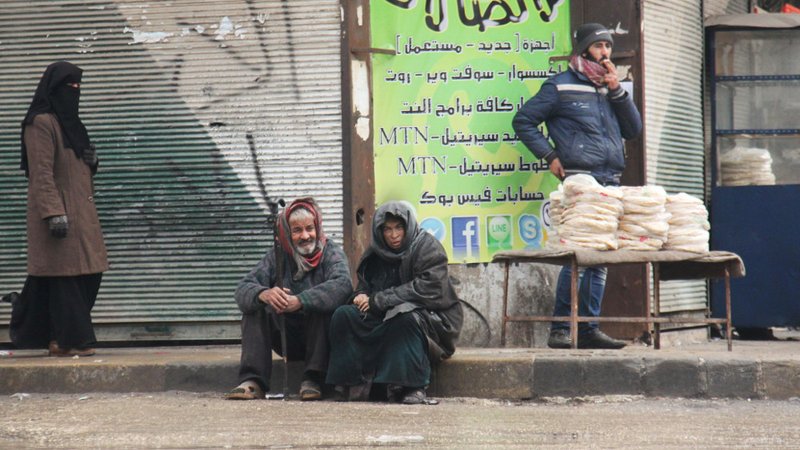
30 December 2017 – Citizens sitting on the sidewalk in front of a telephone service shop in Idlib (rte)
Raqqa “Reconstruction” of telecommunication network coverage towers
At the end of November, Raqqa Civil Council renewed some of Syriatel and MTN’s telecommunication coverage towers in the city, allowing the residents to re-use mobile phones after a five-year disruption, since ISIS took control over the city.
On 1 December, Raqqa Civil Council published on its official Facebook page an interview with Ali Moheisen, the head of the communications office in the city, in which he said that the towers of al-Khayaliya and Riqqa Telephone Exchange are back to service and are providing services for a large part of the city.
Raqqa has been under the control of the Syrian Democratic Forces since the withdrawal of ISIS about a year ago, while it is run by a civil council that is working to restore its services.
Moheisen also stated to Raqqa Civil Council that the towers also provide data service over cell phone lines, allowing subscribers to surf the Internet.
In contrast, local telephone networks do not cover all the rest of areas controlled by the Syrian Democratic Forces. Telecommunication service providers have been gradually declining since early 2012, before being completely unavailable with the control of ISIS.
The two cellular telecommunication companies announced their disruption at that time under a network failure at a point where it was impossible for maintenance workshops to reach it, as well as optical cable failures, which are difficult to repair due to their location in dangerous areas of constant battles.
The residents of al-Hasakah Governorate generally rely on the Turkish satellite internet to run internet telecommunication programs.
Advertisements have been recently spread in the streets of the city of Qamishli announcing the launching of a new telecommunication network, called “Rojava Cell”, to provide Internet service via SIM cards that do not require the cellular communications service.
Opinion poll: security or economic interest?
In an opinion poll conducted by Enab Baladi on its Facebook page on the reasons why the Syrian regime is keeping some telecommunication networks operating in areas out of its control, about 1,000 respondents were divided between the security interest and the economic interest.
57 percent of the respondents voted in favor of security goals meaning that the regime wants to spy on communications emitted from and to these areas, while 43 percent of the respondents considered that this is more likely for economic earning reasons.
While a number of commentators agreed that this could be for both economic and security interests, Jalal Zineddin went further than that. He believes that the regime wants direct ties with people for a “promotional” operation as he described it, considering that telecommunications are an important step in this approach, and the citizens do not have many options. Thus, they will adopt it.
Reliable regional lines
Due to the difficulty of providing the necessary digital protection for telephone calls and communication, through Internet applications, a section of Syrians have begun to rely on regional telephone networks that reach their areas.
The use of these networks prevents the Syrian regime from exercising any kind of surveillance on their users, and provides a sense of freedom of communication. These networks equally relieved users from the burden of looking for digital security programs.
Turkish telecommunication lines in the Syrian North
The residents of the north of Syria, including residents of Idlib Governorate, the northern countryside of Aleppo, and Qamishli, resort to the Turkish telecommunications networks, whose coverage reach the Syrian territories, including Turkcell and Türk Telekom.
The Turkish telecommunication lines are considered the main providers of communication between civilians within these areas on the one hand, and the means of connection with the rest of the governorates and neighboring countries on the other hand.
Khawla Rashid Shihab, who works in the sale and purchase of mobile phones and owns an cybercafé in the city of Qamishli, said in a previous interview with Enab Baladi that the residents of the city are currently relying on Turkish telecommunication lines to communicate, using whether the Internet or mobile phone calls, as the city is near to the Turkish and Iraqi borders.
She added: “We, the shop owners, import telephone lines and the Internet in cooperation with the merchants, and sell them to citizens at the price of ten thousand Syrian pounds per one SIM card.” She pointed out that the cybercafé she runs is witnessing a daily heavy demand, and described that the daily sales of Turkish telecommunication lines of Vodafone and Turkcell operators are rising.
An Iraqi company in al-Hasakah Governorate
After a one-year mobile phone disruption between 2013 and 2014, the residents in the southern areas of al-Hasakah, precisely the towns of Tall Alu, Tall Kojar, and upper and lower Suidat, have largely started using Iraqi lines as an alternative to Syrian mobile lines.
As a result, telecom engineer Joan Mohammad Sheikhamos is encouraging communication with Iraqi telecommunications company Korek Telecom, based in Erbil, the capital of the Kurdistan Region of Iraq, which has installed a tower to strengthen the company’s network in the Syrian Mount Karachok to expand the Iraqi network, as the Turkish network service does not reach the area, and it is not adequately covered by the Internet and communications.
How are telephone and digital telecommunications surveilled?
The telecommunications are divided into three main types: landline telecommunications through different types of home phones connected through switches, wireless telecommunications through the mobile network, and the third type is Internet-connected telecommunications through various social media applications such as WhatsApp, Facebook Messenger, Viber, Telegram, and other smart phone applications.
In an interview Enab Baladi has conducted with an expert on communications and electronic surveillance, who asked not to be named for reasons of personal safety, he said governments had all the tools and means to monitor and find out about wired and wireless telephone communications.
The expert, who works as a digital security coach, distinguished between “democracies” that preserve the privacy of their citizens and “security regimes” that monitor communications and violate the privacy of users to collect data and use their content to reveal the predilections of their citizens and their political affiliations, as is the case with the Syrian regime.
The resources available to the regime allow it to identify the two parties to the call and their numbers, in addition the ability to identify the telephones serial numbers and their types, as well as the ability to record those calls.
This was confirmed by Wael Mousa, an expert on information security, in his interview with Enab Baladi. He explained the difference between the methods of controlling wired and wireless telephone communications and Internet communications.
According to Mousa, communications, whether wired or wireless, belong to private or government telecommunications companies. In both cases, these companies have the ability, according to their equipment, to record and track all calls, with “huge” capabilities to locate the phone roughly by the tower from which they took the signal, and they can identify the owner of the line and the caller and record the entire conversation.
He added that governments have devices to record and track calls through key words predicting the type and style of the conversation, as well as monitoring phone numbers of particular people who may be wanted for the security services in the state or have a suspected activity.
Mousa pointed to the existence of a comprehensive method of control through the keywords that determine the style of the conversation even if it was camouflaged, and through these patterns and their analysis, a person’s intentions are defined.
The information security expert told Enab Baladi that the Syrian government had signed several contracts with European companies in the past, under which they imported devices, software, and experts to carry out such operations.
According to Mousa, “Digital and electronic communications control over the Internet is different from what it is in telephone communications. It can track telephone calls directly while it cannot control the Internet in the same way, but through Internet communications, governments can detect the specific identifiers of the devices and the type and direction of the request, and sites that are opened, devices used, and their locations.”
Digital communications are more secure than telephone communications
It is difficult for users of telephone and mobile communications networks to protect themselves from surveillance to a large extent, as all their contacts are monitored by private and government telecommunications companies.
The information security expert Wael Mousa said that “anyone around the world who uses a telephone line is censured, but some countries have laws and regulations that prevent espionage and information scrutiny. Even telecommunications companies are morally forbidden to cooperate with governments except by a judicial decision. Countries under dictatorial regimes, however, do not have these procedures and do not need a judicial decision to spy on communications.”
A technical expert who is specialized in digital security training told Enab Baladi that “there is no way to escape surveillance for telephone communications, but their lack of use and access to electronic communications through the Internet is somewhat better, and there are solutions to protect user data and communications.”
Digital protection
According to the technical expert, steps start from the operating systems and software, and their continuous update, and making sure to get the latest updates to operating systems and “anti-virus” and all programs used, whether computers or mobile phones, as well as ensuring access to all software and applications from trusted sources exclusively.
In order to avoid surveillance and electronic hacking, according to the technical expert, passwords must be carefully chosen and should not contain personal or general information that can be guessed. These words must be long and should be added symbols and numbers so that they cannot be easily guessed.
He added that “many users consider that keeping a large number of passwords for more than one program is difficult, but there are applications and programs that make it easy to save passwords and not to lose or hack them.”
Two-step verification is required to protect e-mail, Facebook and most website accounts. This feature can be activated on most websites and social networking sites.
Anti-virus software, which works against any malicious software that can penetrate the device and contribute to the leak of personal information, cannot be dispensed with, especially if a particular person was targeted by the software through e-mail or other sites or fake social networking sites, according to the technical expert.
Extensions and Applications
The expert advises Internet users in Syria to choose browser add-ons that help maintain privacy and prevent different sites from tracking the behavior of a digital user, whether it is tracking the sites the user is visiting or by targeting them with ads that may contain unreliable links.
Applications such as “Adblock,” “uBlock Origin” and “Everywhere” can hide digital behavior. As an alternative to using these plugins, a browser with all these plugins is automatically available as a “Brave” browser that is concerned with the privacy and security of internet users.
The “Tor Browser,” which provides this privacy and protects the user against all types of surveillance and espionage, can also be used.
In addition to browser extensions, there are applications that encrypt messages and conversations between the two parts of the conversation and protect them from eavesdropping or leaking as well as the advantages of automatic destruction of certain messages such as the “Signal” application. There are also applications that allow contact with several people at one time, such as a “Jitsi Meet” application, which does not require the creation of any account for any party to the meeting to protect privacy.
Encryptions and Internet Security
Encrypting files is very important to prevent access to them when they are stored, whether on computers or electronic storage sites such as “Drive,” “Cloud” and others, according to the technical expert.
All devices must be secured in general, such as the computer and the phone, and should not connect to other devices that may affect them with malicious software. Leaving the devices without control provides an opportunity to those who want to steal information or passwords, through malicious software and other available methods.
The perimeter must be fully secured and secure digital communications should be used to avoid the risk of any espionage or surveillance, whether by government or security authorities or by some intruders who may employ the user’s data for extortion and other purposes.
It is also necessary to stay away from unknown hackers through social networking sites and not to randomly accept invitations on Facebook and other sites so as to avoid falling victim to a kind of social engineering aimed at the same objectives of surveillance and espionage.
if you think the article contain wrong information or you have additional details Send Correction
النسخة العربية من المقال
-
Follow us :












 Expressive photo (Enab Baladi)
Expressive photo (Enab Baladi)





 A
A
A
A
A
A

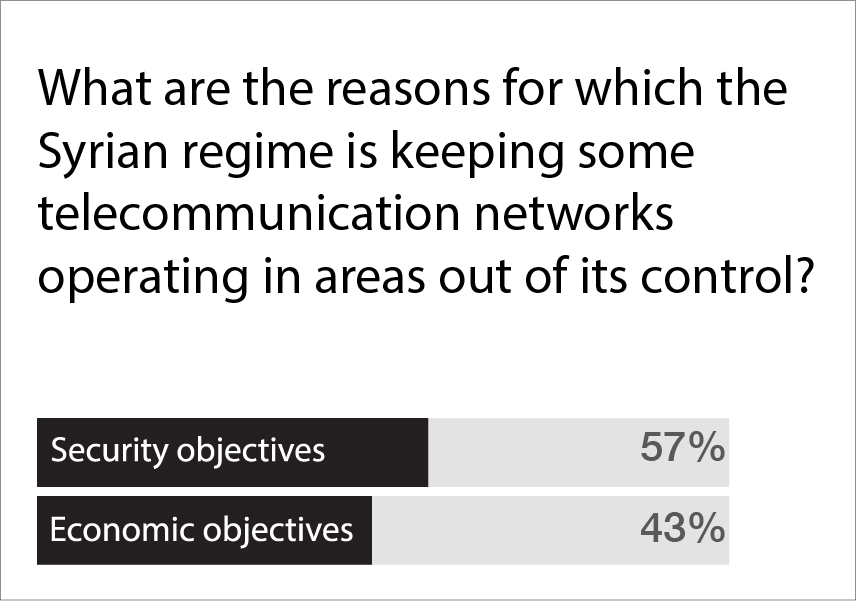

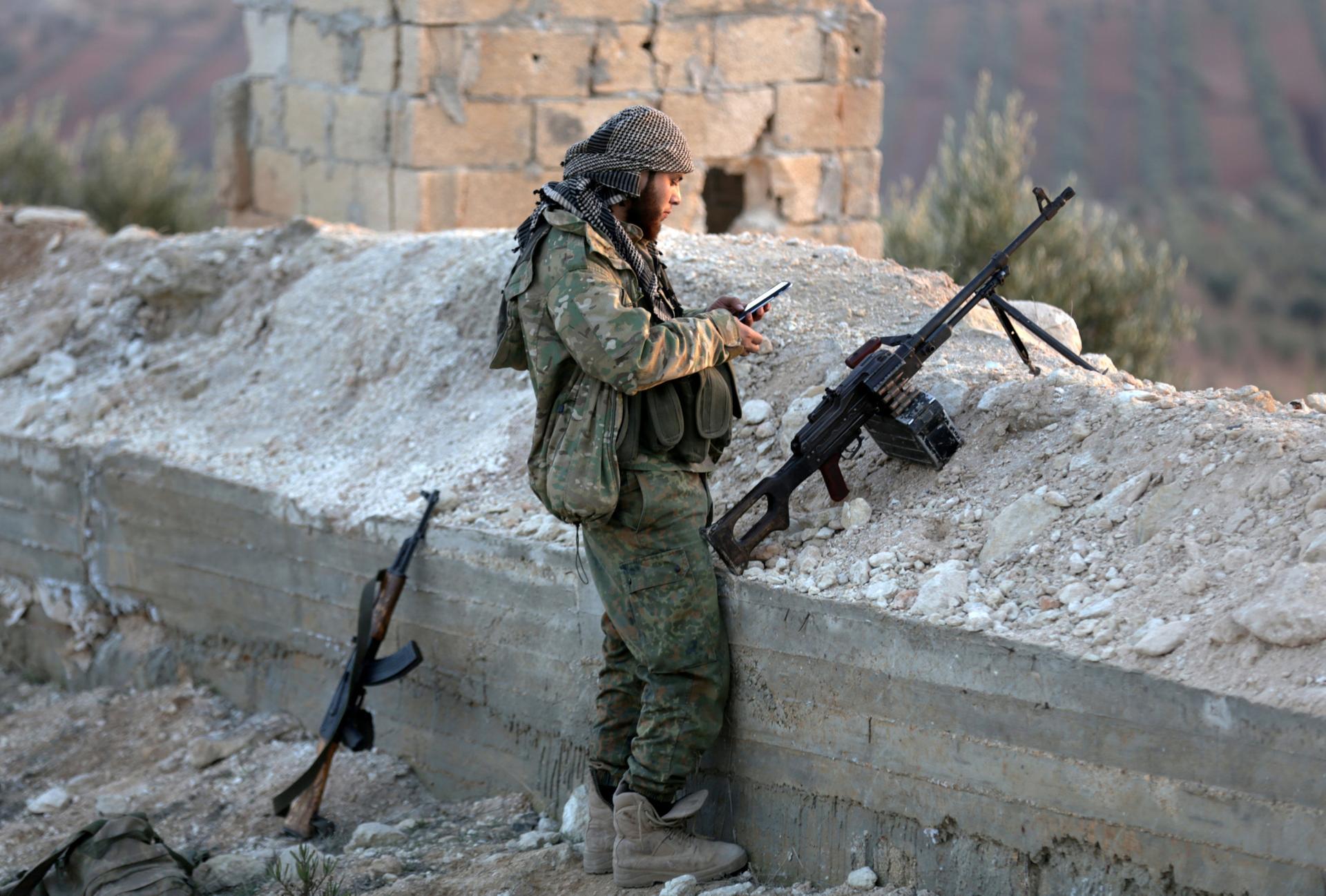
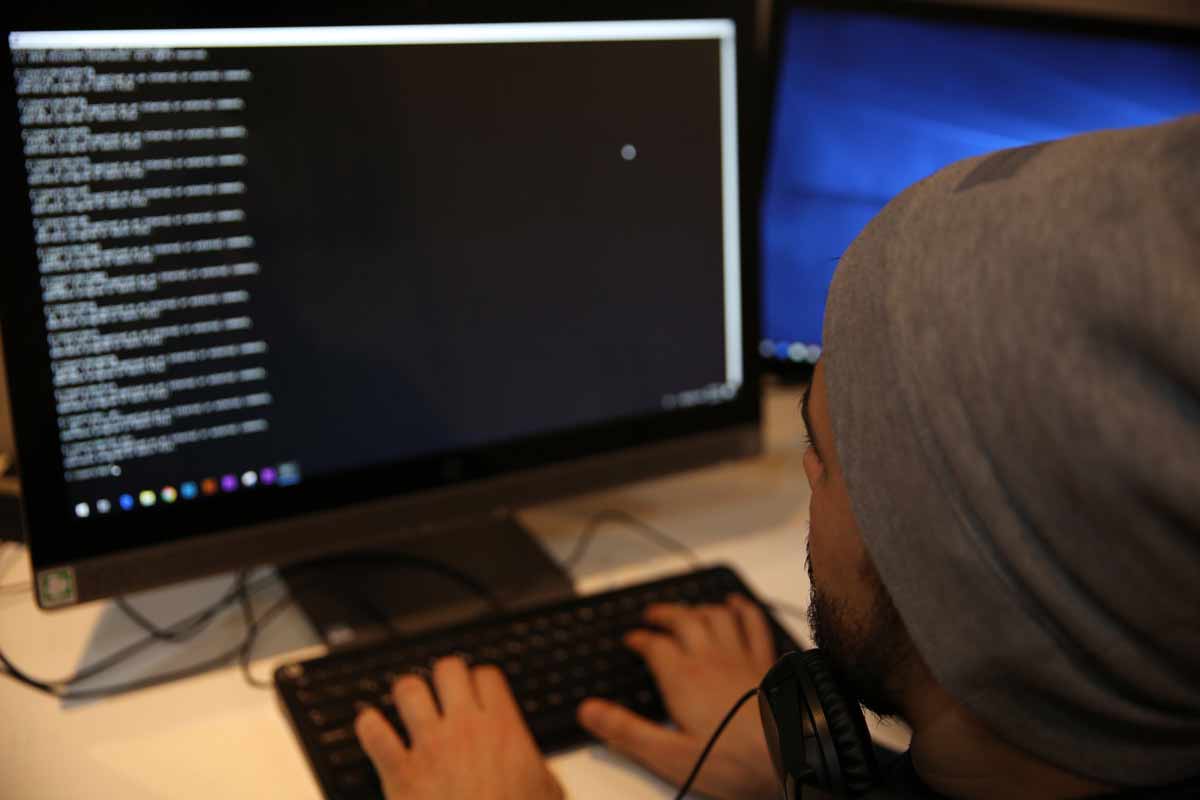


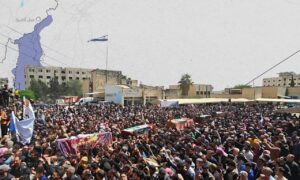




 More In-Depth
More In-Depth